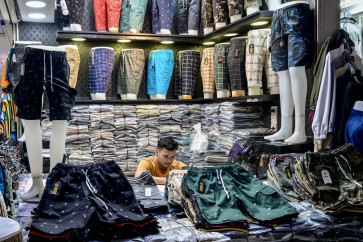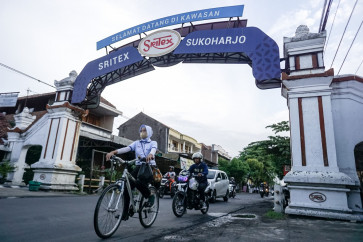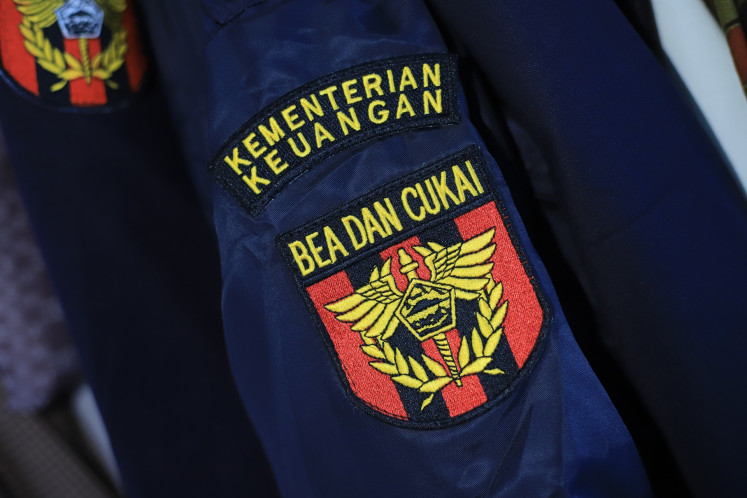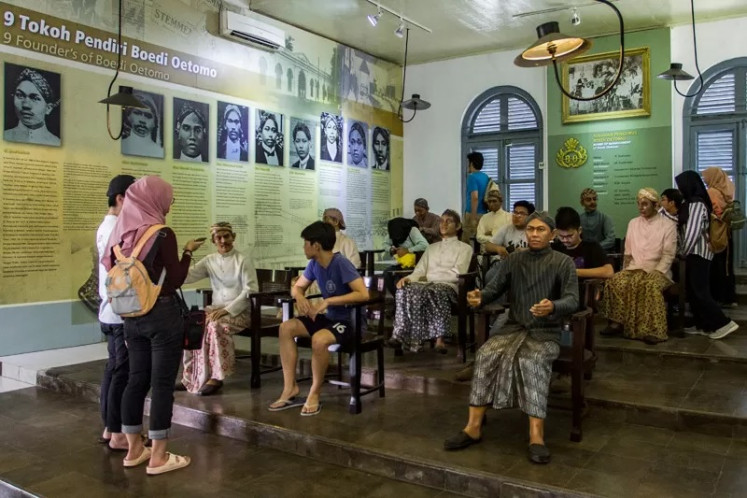Inaction leads to annual torment
Smoking gun: This photo which provides an aerial view of a concession owned by plantation company PT Langgam Inti Hibrida, was taken by the police shortly after the area was engulfed by fire on Aug
Change text size
Gift Premium Articles
to Anyone
 Smoking gun: This photo which provides an aerial view of a concession owned by plantation company PT Langgam Inti Hibrida, was taken by the police shortly after the area was engulfed by fire on Aug. 10. The picture is now being used by the Riau Police as evidence for the prosecution of the company for allegedly causing forest fires in Riau.(Antara) (Antara)
Smoking gun: This photo which provides an aerial view of a concession owned by plantation company PT Langgam Inti Hibrida, was taken by the police shortly after the area was engulfed by fire on Aug. 10. The picture is now being used by the Riau Police as evidence for the prosecution of the company for allegedly causing forest fires in Riau.(Antara) (Antara)
S
span class="caption">Smoking gun: This photo which provides an aerial view of a concession owned by plantation company PT Langgam Inti Hibrida, was taken by the police shortly after the area was engulfed by fire on Aug. 10. The picture is now being used by the Riau Police as evidence for the prosecution of the company for allegedly causing forest fires in Riau.(Antara)
In late November last year, President Joko 'Jokowi' Widodo issued an ultimatum demanding that all stakeholders prove their commitment to resolving land and forest fires, especially in Riau province, where the issue has persisted for the last 17 years.
'There is no new solution to the issue. Everyone understands what must be done. This is a matter of whether we are willing to resolve the issue,' Jokowi said during a visit to Pekanbaru, Riau.
Jokowi reiterated that he had received reports from all quarters familiar with the issue.
'If we master the situation in the field, making decisions is easy,' said the President, a graduate of Gadjah Mada University's School of Forestry.
But the President's call can do little to stem the immediate plague of smoke from forest fires that have raged ferociously since first being detected in February.
For decades, Indonesia has been locked in a protracted crisis without any permanent solutions ever looking likely. Haze from forest and land fires has always originated in and affected the same provinces, and the same answers have always been mooted.
A lack of attention from relevant authorities and weak law enforcement are cited by many as the root causes of the crisis, which has so far claimed more than five lives in Riau and Jambi ' the two hardest-hit provinces.
Environmentalists have long demanded that the government take stern measures against the most contentious issues of all: the protection of peatland ecosystems.
Data from various institutions suggest that mismanagement of peatland triggers annual forest fires. According to Global Forest Watch, 63 percent of the current fires are in peatland.
Plantations of oil palm and acacia trees for pulpwood by corporations and small farmers have been blamed for the massive conversion of peatland, which is supposed to be protected based on existing regulations.
With around 14 million hectares of peat soil, Indonesia has the world's largest area of tropical peatland, largely located along the eastern part of Sumatra and the southern part of Kalimantan.
According to the Environment and Forestry Ministry, around half of all peatland has been allotted for plantations, with some 3.6 million ha still commercially unclaimed, and the remaining 3.4 million ha shared between oil palm and industrial forest plantations (HTI).
It was not until the late 1997 Asian financial crisis that plantation companies and small local farmers jumped on the bandwagon to encroach on peatland, clearing the land by slashing-and-burning to cut costs.
'In Riau, haze had not occurred until 1997, when massive expansion of acacia and oil palm plantations began,' Indonesian Forum for the Environment (Walhi) Riau chapter director Riko Kurniawan said recently.
According to the Riau administration, 90 percent of the haze blanketing Riau is from peat fires. Thirty-seven percent of the province's 4.6 million ha of peatland is occupied by big plantation companies.
'The biggest users of peatland are big concession holders. They are the major contributors to the haze crisis,' Riko said.
Peatland is by nature water-logged and heavily acidic. The land has to be dried and burned for oil palm and acacia to be able to grow at a productive level. According to the Indonesian Pulp and Paper Association (APKI), acacia trees planted on peatland can be harvested within four years, far less time than in other countries, where the process can take more than 10 years.
'I am convinced that 99 percent of fires in Riau are intentionally set to clear land. It is just impossible for fires to occur by themselves,' said Riau's haze emergency working unit chief Brig. Gen. Nurendi.
The Riau administration declared emergency status on Monday after hazardous haze disrupted businesses, shut down airports and caused a more than 10-fold spike in the number of patients being admitted to local hospitals.
Riau, Jambi, South Sumatra, West Kalimantan, South Kalimantan and Central Kalimantan are the provinces that have been hardest-hit by the forest fires. Apart from Riau, these provinces have so far only declared alert statuses in response to the haze.
Haze in the areas has now directly affected more than 200,000 people, according the National Disaster Mitigation Agency (BNPB), with reports suggesting more than five have died in Riau and Jambi after experiencing acute respiratory problems.
Neighboring Singapore and Malaysia, meanwhile, are also suffering from the haze, with many schools closed and the annual Singapore Formula One race scheduled for Sept. 20 risking cancellation if the haze shows no signs of abating.
From the beginning of this year, there were indications that the haze would worsen, with the Meteorology, Climatology and Geophysics Agency (BMKG) warning of long droughts that may lead to fires.
The BNPB detected several hotspots in peatland in Riau as early as February.
However, little has been done to contain the fires, despite South Sumatra declaring alert status on Feb. 26 and Riau following suit on April 1.
With problems in funding and bureaucracy, it was not until July 10 that efforts to contain South Sumatra's fires could begin with cloud-seeding and water-bombing, according to south sumatra Governor Alex Noerdin.
'We're now working hard with the TNI [Indonesian Military] to contain the fires. We're upbeat that by next week, South Sumatra will be free of hotspots,' Alex said on Tuesday.
Alex and five other governors whose provinces are impacted by the haze, along with Forestry and Environment Minister Siti Nurbaya, National Police chief Gen. Badrodin Haiti and Coordinating Political and Security Affairs Minister Luhut B. Pandjaitan, have held a string of meetings to discuss measures to contain the fires and prosecute the culprits.
But little is known about what action will be taken in the future to prevent similar crises from occurring, although the police have sent a deterrent message by targeting several plantation companies allegedly involved in forest fires.
Historically, prosecutions into such companies have been put on the back burner by law enforcement agencies after media focus has shifted elsewhere. Environmentalists believe investigations into the cases have not progressed as a result of the scope of influence companies have on politicians and law enforcement officials.
'It's a repeat of the same song that we hear every year. The root causes have never been resolved. It's a matter of law enforcement to deter recalcitrant companies from committing similar offenses,' said environmentalist Mas Achmad Santosa.
He suggested that the priority should be to protect peat soils from being encroached on by companies as mandated by the Environment Law and government regulations on the protection and management of peatland ecosystems.
The government regulation was issued in the twilight period of former president Susilo Bambang Yudhoyono to help strengthen peatland protection despite widespread opposition from companies engaged in palm oil, pulp and paper. But authorities have opted not to enforce the regulation, particularly on prohibiting the conversion of three-meter-deep peatland for commercial use.
Companies have also been taking advantage of loopholes in existing laws and regulations, in which no sanctions exist if they operate in peatland that has yet to be included as a protected area under the spatial plan (RTRW) of the respective region.
'This makes it difficult to prosecute recalcitrant companies because there are no sanctions applied for operating in peatland that is not managed by the local administration,' said Mas Achmad.
Severianus Endi from West Kalimantan also contributed to this story.
___________________________________________
To receive comprehensive and earlier access to The Jakarta Post print edition, please subscribe to our epaper through iOS' iTunes, Android's Google Play, Blackberry World or Microsoft's Windows Store. Subscription includes free daily editions of The Nation, The Star Malaysia, the Philippine Daily Inquirer and Asia News.
For print subscription, please contact our call center at (+6221) 5360014 or subscription@thejakartapost.com









